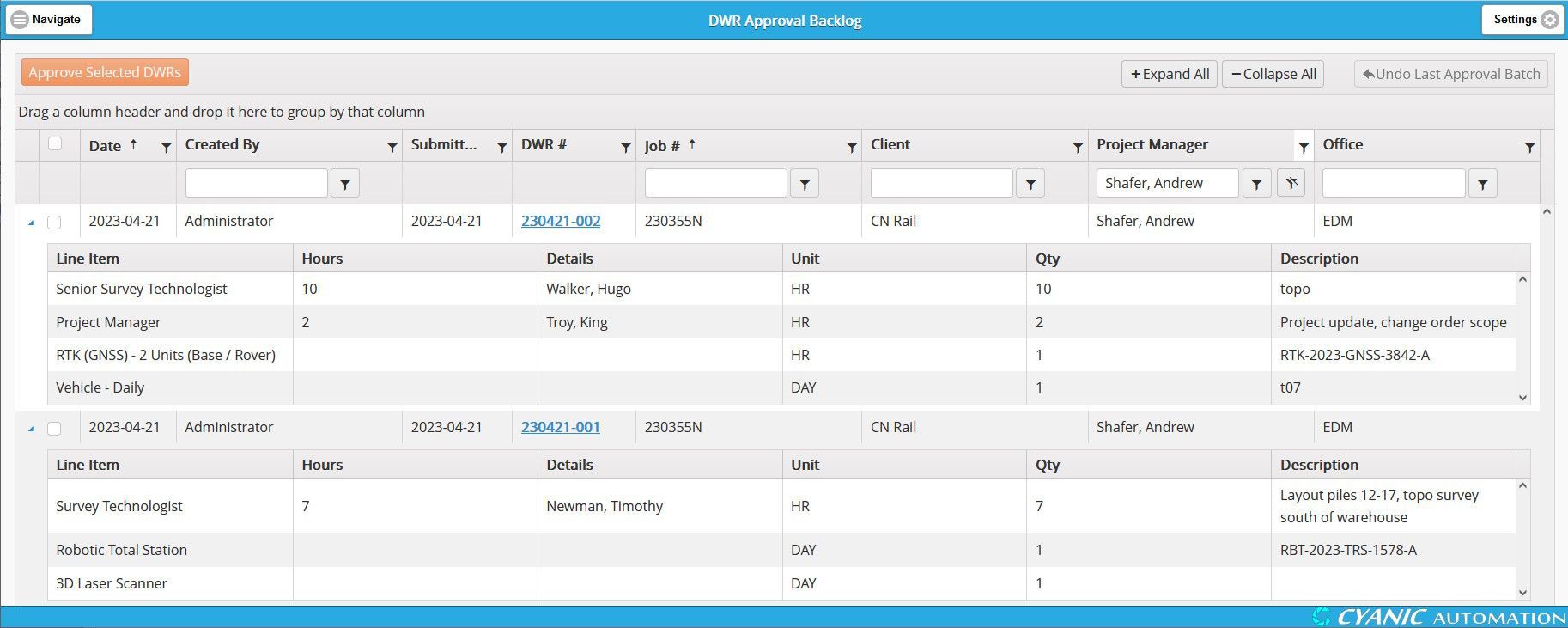· best practices · 5 min read
Why project managers should approve time sheets

One of the easiest changes that survey companies can make to improve their top-line is to have project managers approve time sheets and equipment charges (i.e., Daily Work Records) for their projects. Over the years that we’ve worked with surveyors, we’ve seen this so many times that we can confidently say this is best-practice, and it’s so effective that we’ve built it into Job Book’s workflow in a way that’s easy to use.
Below I’ve provided some simple best practices that can hopefully benefit your company. Nobody likes thinking about time sheets, but they really provide the foundation for improving profitability - getting this part right sets you up for so many valuable things down the road, which we’ll cover in future posts.
Here’s what we normally recommend to our customers:
- Time sheets submitted by the end-of-day. This is important because:
- Time entries get worse the longer they are left, and by the end of the week nobody can really remember what they did. It’s hard to help people be accountable when valuable information is lost.
- The sooner time is submitted, the sooner it can be billed.
- The sooner time is submitted, the sooner it shows up on PM dashboards and utilization reports to help make decisions.
- Time sheets approved by project managers the next morning. This is important because:
- If there are issues in a time sheet, these can be raised with staff and corrected while it’s still fresh.
- If staff are entering time incorrectly because of a misunderstanding (billing against the wrong line items, entering billable time as overhead, etc), sorting this out as soon as possible will prevent future errors.
- Having up-to-date reports with approved data (e.x., the Job Book’s Active Job Dashboard) helps project managers see how their jobs are going in real-time. If it looks like a job will go over budget, the PM can act now before it’s too late to do something about it.
- The sooner time is approved, the sooner it can be billed.
What happens when project managers approve time sheets:
- Billable time goes up. Our customers notice this almost immediately. This is mostly due to catching time that was billed to the wrong code, or time that wasn’t billed to the job when it should have been. Anecdotally, companies see around a 5-10% uplift in hours that can be charged to clients. One of our larger customers told us they found over $80,000 of mis-coded time in their first month of using Job Book, all of which went to their top-line.
- Accountability goes up. Basically, staff are given the tools to be accountable and they are incentivized to enter hours accurately. This is even more true when there’s visibility into jobs, which makes it harder for people to hide time in other places to make their projects look better.
- Fewer invoice errors and disputes. When you have a system that helps sanity check data that will eventually end up on an invoice, administrators won’t have to waste as much time dealing with invoice issues with clients.
- Invoicing is quicker. When a job is finished and the time is appoved and finalized, you can bill that job right now and get paid sooner.
How to deal with staff who don’t submit or approve time sheets in a timely manner:
This usually isn’t a major problem, but here are some tips to make things smoother:
- Make sure all staff know the importance of time sheets, how it’s the life-blood of the company and how late or unbilled time impacts everyone. Sometimes technical people don’t really know because it’s never been explained to them, and they haven’t had much exposure to the business side of the company.
- Make it as easy as possible to submit and approve time sheets. Make sure it can be done in the field, from their phones or laptops. Make sure it’s clear which line items to use for the job. If your process involves paper, email, or spreadsheets, know that this is introducing friction and slowing things down in your company.
- Make sure everyone knows that the data is easily visible up the chain, so that everyone is incentivized to be diligent around time sheets and overall project performance.
That’s pretty much all there is to it - following time sheet best-practices really is the easiest thing surveyors can do to improve their company.
If you already have tools for time sheets / costing / project management, then that’s great, you’re already ahead of most companies out there!
If you’ve been thinking about getting an operations management system, one that’s enjoyable, easy to use, and built specifically for land surveyors, please check out Cyanic Job Book and give us a call, we’d love to talk to you!
In future posts, we’ll discuss some of the interesting things you can do with all the data you’re collecting in your daily work records, including:
- Job health monitoring (how are my jobs going, in real-time).
- Utilization reporting.
- Work-in-progress (WIP) reporting.
- Invoicing best-practices.
- Finding where you’re coming up short on estimates and adjusting rate sheets for future projects.
- Learning what are your best kinds of clients and jobs.
If you have other ideas for content please join the ‘Business of Land Surveying’ group on LinkedIn and let us know, or reach out to us directly, we’d love to hear from you.



